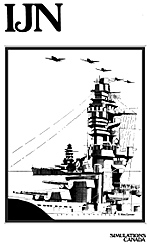
SimCan says:
The first of a series of three completely mateable games that will cover all aspects of WWII naval combat on a low level tactical scale. Using silhouette type counters representing individual vessels and aircraft, 100 yard hexes, 90 second turns, unique search systems, complete damage rules, and realistic combat interaction mechanics. IJN accurately simulates the long periods of uncertainty broken by sharp, violent clashes that characterize war at sea. Scenarios range from picket destroyer skirmishes to the Battle of Midway.
Components
Box ziplock or cardboard box
1 22"x28" mapsheet (with 8 6½"x10½" geomorphic sections marked A-H)
1 half-size rulebook
255 die-cut double-sided counters
Counter Manifest
116 US counters (61 ships, 24 aircraft, 8 torpedoes)
9 Dutch counters (4 ships, 5 torpedoes)
9 British counters (4 ships, 5 torpedoes)
3 Australian ship counters
99 Japanese counters (49 ships, 42 aircraft, 8 torpedoes)
19 white counters (7 cargo ships, 6 smoke markers, 6 randomizer markers)
The Reviewers say:
[IJN] makes one look forward to the other two still to come, despite the fact that it has to deal with ... the mechanics of tactical naval simulation, a subject on which few gamers agree ... [T]he well-designed rules and good graphics make for fast-moving matches that are fun to play. --Kirk Stroup, F&M 18.
The [IJN] rules are fairly simple and a little broad-brush. Even so, the game is a little slow in play, requiring a good deal of bookkeeping and cross-indexing with the usual die rolls ... Designer Stephen Newberg is an old navy man. His experience shows, but even he has not found ideal solutions to the problems of tactical naval design. --Friedrich Helfferich with Joseph Miranda, F&M 70.
IJN can be learned quickly and played fast. There is very little sitting around ... the game moves very quickly ... IJN is not too bad a game. The scale has got to be changed however or the game is useless. --Dan Sichel, The Wargamer 9.
Collectors Notes
Boone lists low, high and average prices of 5/21/11.67 at auction and 7/20/13.17 for sale.
Errata
Rule 9.4 last sentence should read ...have not been evaded and then resolve each individual torpedo attack at the Rule 13.1, fourth sentence should read: ...CO, FFm & DE = 2, ... BC & CE = 5, BB & CV = 6.
Scenarios: Cape Esperance took place 11 October rather than 11 September and the U.S. forces all start NE, 10, E rather than SW, 10, H.
The counter for Furuloka #4 has the gun strength and torpedo salvo numbers reversed.
On the Bomb Combat Table superiorities 2 & 3 at a die roll of 3 should result in a dash for a No Effect.
On all tables superiorities greater or less than the limits of the table are resolved at the limits of the table.
Aircraft taking damage in a capability that has been reduced to zero suffer a loss of 12 movement points.
Scenario
Red Star, Rising Sun (what-if)
A. While on patrol off the coast of Korea on 13 August 1945 a Soviet force encounters the last remnants of the Japanese navy attempting to stave off the inevitable.
B. SO 1 DD Leningrad, NE 7 E
2 DD Type-7, NE 7 E
1 DD Type-4, NE 7 E
US 1 CL Omaha, NE 7 E
JA 2 DD Fubuki, SW 10 D
2 DD Kagero, SW 10 D
2 CO Mikura, SW 10 D
C. Dark night.
D. The US CL is a lend-lease ship used by the Soviets.
Additional Information
Please see page 44 for more information relating to IJN, Kriegsmarine, Torpedo! and Schnellboote.
Back to Simulacrum Vol. 3 No. 2 Table of Contents
Back to Simulacrum List of Issues
Back to MagWeb Master Magazine List
© Copyright 2001 by Steambubble Graphics
This article appears in MagWeb (Magazine Web) on the Internet World Wide Web. Other military history articles and gaming articles are available at http://www.magweb.com